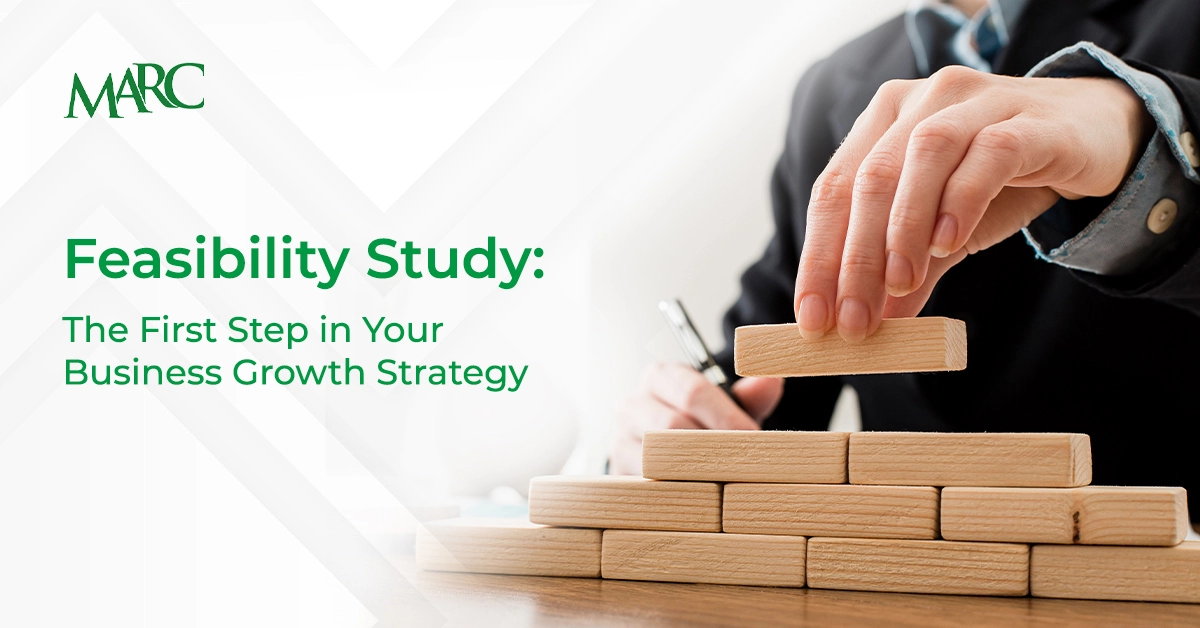
Are you thinking of growing your business but unsure whether it is actually going to succeed or your efforts will simply go in vain? Then the only way to know the outcome is by conducting a feasibility study.
When planning for long-term business growth, a well-conducted feasibility study is highly beneficial. Whether you’re launching a new product line, expanding operations, or, as in one of our recent projects, establishing a world-class educational institution, a feasibility study is what helps you get one step closer to success.
Through this blog, you will learn all about “why a feasibility study is the first and most crucial step in your business growth strategy?” and “how it can take you on a path that solely promotes long-term profitability and business expansion?”
What is a Feasibility Study?

So, what exactly is a feasibility study? Just think of it as your project’s first verification process.
In simpler words…A feasibility study is a detailed analysis that evaluates all important aspects of a proposed project to check if it can succeed. It examines everything from market demand to financial projections and operational challenges to identify risks and rewards.
By conducting a feasibility study, businesses can make informed decisions about whether to proceed with a project or reconsider their approach, further increasing their chances of successfully entering the market.
At MARC, we make sure that every successful business growth strategy begins with a detailed feasibility study. This way, you can identify potential risks and also discover better opportunities, helping you allocate resources wisely for maximum return on investment (ROI).
Why is a Feasibility Study Important in Your Business Growth Strategy?
When it comes to growing your business, it’s not just about expanding exponentially, it’s more about growing smarter. That’s exactly where a feasibility study comes in.
Here’s how it can make a difference:
- Reducing Risks: It helps identify potential issues at the earliest and provides contingency plans. This includes addressing market demand, competition, legal challenges, and financial viability.
- Allocating Resources Efficiently: It helps you make the most of your time, money, and manpower and ensure they are invested in the right areas. This way, you can save unnecessary costs down the line.
- Improving Investor Confidence: By presenting clear data and projections, a feasibility study proves the potential of your business. Hence, you gain the trust of investors or secure the required funding to move forward.
- Strategizing for Long-Term Success: The insights you gain from a feasibility study allow you to build a strategy that enables sustainable business growth instead of short-term wins. This helps you focus on the bigger picture, letting you build a strong foundation that gives you a competitive edge in the long run.
Key Components of a Feasibility Study for Business Growth:
A strong and well-structured feasibility study comprises several key areas of analysis. At MARC, we break it down into the following business growth strategy components:
1. Market Feasibility:
This evaluates the market demand, trends, and customer needs for your product or service. By carefully understanding your target market and analyzing relevant market trends, we help you identify if there’s a right audience and how you can successfully position your offering for market penetration.
2. Technical Feasibility
This examines the infrastructure, hardware, and software requirements for your project. We check whether the necessary technology requirements are available and scalable to meet the evolving future demands, ensuring smooth operations and long-term growth.
For example, do you have the technological infrastructure to support expansion? If not, can it be developed cost-effectively?
3. Financial Feasibility
This includes a detailed analysis of your financial projections, potential return on investment (ROI), and overall profitability. Our feasibility studies help you decide if your project makes financial sense and if the potential returns are worth the investment you’ve made.
4. Operational Feasibility
This assesses operational strategy, business processes, and resource allocation. We review your internal operations, including logistics and human resources, and check if they have the ability to handle the project smoothly and efficiently.
5. Legal and Regulatory Feasibility
Every project must follow legal standards and industry requirements. We review the legal structure, compliance issues, and industry regulations to identify any hurdles and make sure your project aligns with necessary laws, enabling hassle-free execution.
6. Scheduling Feasibility
Timely delivery is important for any and every business to succeed. Scheduling feasibility determines whether the project can be completed within your desired time frame, helping you manage deadlines and milestones effectively.
Related blog: 5 key stages of internationalization of business
Steps to Conduct a Feasibility Study for Business Growth:
At MARC, our feasibility studies are designed to be thorough yet efficient. We conduct in such a way that the study produces a successful business growth strategy.
Here’s a quick overview of how we approach the process:
- Preliminary Analysis
We first gather initial feedback from key stakeholders and perform market research to assess the overall viability of the project objectives and scope definition. This step helps us rule out impractical ideas at an early stage, saving both time and resources.
- Financial Projections
We prepare a detailed income statement, outlining expected revenue and costs to forecast your project’s profitability. This step is essential for assessing whether your venture is financially viable or not.
- Market Research
Conducting a thorough market survey allows us to measure market demand, understand competition, and position your business effectively. This step is vital for projects that are aiming to enter or expand in the market.
- Operational Planning
At this stage, we review your business structure and operations to ensure they match the project’s goals. Can your team manage the extra workload? Do you need more resources? We help you find answers to these questions, making sure your operational efficiency is a priority.
- Risk and Opportunity Assessment
Every venture comes bearing risks of one kind or another. We help identify them early and provide risk mitigation strategies to ensure smooth project execution. We also point out opportunities for growth that might have been previously overlooked in your business growth strategy.
- Go/No-Go Decision
Based on the feasibility study’s findings, we provide you with a clear recommendation on whether to move forward with the project or reconsider your approach. This allows you to make informed, confident decisions.
Case Study: K12 Residential School in Pune, India
Recently, we had the opportunity to conduct a location-based feasibility study for a world-class K12 residential school in Pune, India. The client, an accomplished group of education professionals, wanted to ensure that this educational institution met the highest standards in terms of infrastructure, operational efficiency, and market demand.
What We Did:
We started by looking at different factors to see if it was feasible to set up a residential school at the chosen location. Our analysis included:
- Common Size and Variance Analysis: Checking standard costs in the industry.
- Key Cost Center Analysis: Identifying the main operational costs that would impact the school’s financial health.
- Budget vs. Actuals Comparison: Comparing expected costs with real expenses at similar schools.
- Vertical/Segment Analysis: Evaluating market demand in different education segments and grades.
By using both primary and secondary market research, we also examined the local demand for residential schools by talking to parents, students, and staff. This included interviewing key stakeholders in the education sector to gain valuable insights into how the school could be positioned in the market.
Outcome:
Our thorough research led to a detailed blueprint for the project, containing in-depth execution strategies and financial forecasts. The client now has a clear path forward, and the school is right on track to make a meaningful impact in the education sector.
It’s indeed a rewarding experience to watch how our work contributes to such a vital community initiative!
Related blog: A comprehensive guide to starting your own business: 2024 edition
Let MARC Guide Your Business Growth Strategy

A well-executed feasibility study is more than just a business formality, it’s the main foundation of a successful business growth strategy!
At MARC, we’re fully focused on helping your business make informed decisions with our tailored feasibility studies, favoring businesses of all kinds. Our aim? It has always been to empower you to minimize risks and boost profitability and ultimately set you up for long-term success, so that you stay ahead of market trends.
Are you ready to take the first step in your growth journey? Contact MARC today, and let’s start building a smarter business growth strategy.
Frequently Asked Questions:
The feasibility study comes first, before the business plan. It assesses whether a business idea is practical, and only after determining feasibility, the business plan is created to outline how to move forward.
A feasibility study checklist should include essential elements such as a clear description of the problem, a project brief, potential project site analysis, development options (including a “Do Nothing” scenario), a well-prepared project budget, and a cost/benefit analysis.
The main goal of a feasibility study is to help decision-makers understand if a proposed project or investment is likely to succeed. It focuses on both the known costs and the expected benefits to make informed decisions.
Feasibility studies are crucial because they help learn all about the logistical, financial, and market challenges of a proposed project. They estimate funding needs, project potential returns on investment, and conduct a thorough assessment of the market for your intended product or service.
Skipping a feasibility study can lead to wasted time and resources on projects that might not succeed. It’s easy to overlook important challenges that could put your project at risk. That’s why, a feasibility study should be implemented as it helps you spot these risks much in advance and make better decisions.

